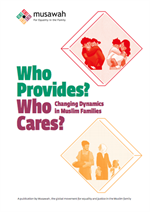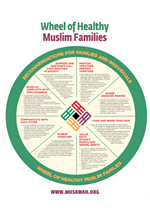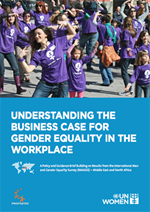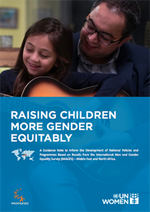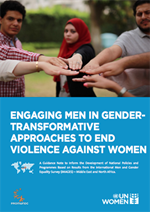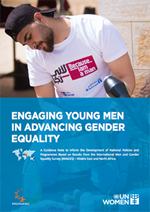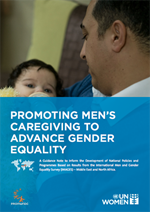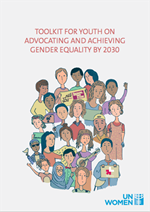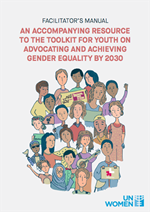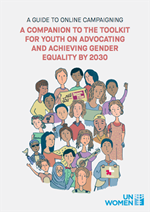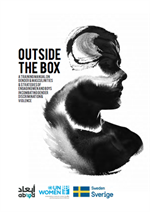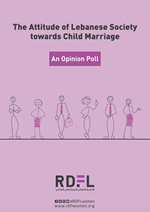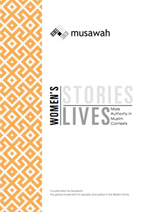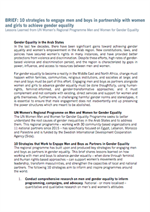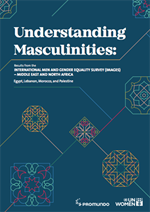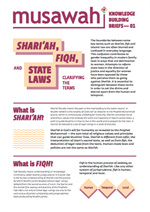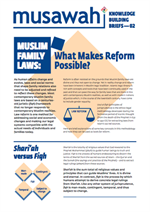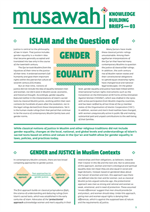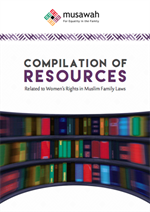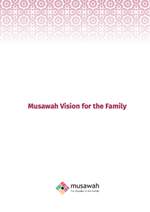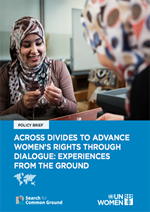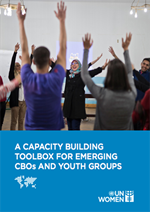Engaging Men and Women for Gender Equality
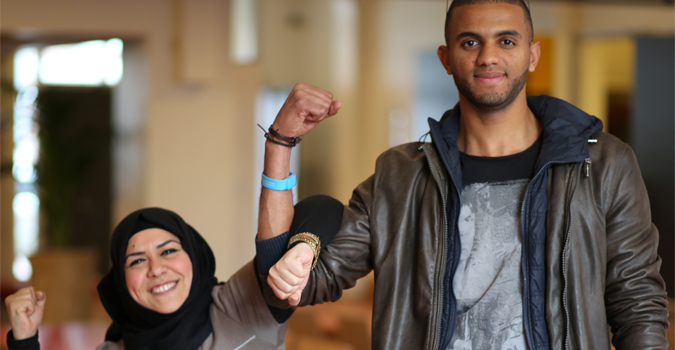
The Men and Women for Gender Equality programme of UN Women’s Regional Office for the Arab States, funded by the Swedish International Development Cooperation Agency (Sida), seeks to improve understanding of the root causes of gender inequalities in the Arab States, and address these through a bottom-up approach, including through the engagement of men and boys for gender equality.
Building upon the results of Phase I (2015-2018), the second phase of the programme (2019-2022) has expanded its implementation in Egypt, Lebanon, Morocco, and Palestine to include Jordan and Tunisia, targeting a total of six countries in the region.
Our Goal
With the overall goal of creating communities where men and women in the Arab States’ societies are able to exercise their rights and opportunities equally, the programme intends more specifically to contribute to the following:
- Create communities that have more gender equitable attitudes and behaviors.
- Integrate and promote gender-responsive practices in key regional and national institutions (governments, academia, faith-based institutions, media) and regional networks.
- Advocate for and support the drafting, revision and/or approval of laws, policies and strategies that promote gender equality.
How we work:
Research and data:
- In 2020, the International Men and Gender Equality Survey (IMAGES) is being conducted in Jordan and Tunisia by UN Women, Promundo and local research partners. This research was undertaken during Phase I in Egypt, Lebanon, Morocco and the State of Palestine. IMAGES is the first multi-country study in the Miidle East and North Africa (MENA) region to take a wide-angle lens to the lives of women and men and their attitudes towards gender equality.
- Knowledge products and tools on women’s rights in Muslim families are being developed to promote gender equitable interpretations of religious texts, in collaboration with Musawah.
Evidence-based advocacy:
- Guidance notes and policy briefs were produced to inform the development of national policies and programmes on fatherhood and caregiving; gender socialization; promoting the engagement of youth, with a focus on young men; ending violence against women; and family-friendly workplace policies and equitable workplace practices.
- A youth advocacy toolkit is available to support young people to promote gender equality, as well as a number of communication and social media products. All of these have been adapted to each country’s context.
- The #Because_I_am_a_man regional campaign, launched in 2017 and expanding during Phase II, uses the key findings of the IMAGES research and other communications material to challenge gender stereotypes, raise awareness on the positive roles men can play in achieving gender equality and to advocate for paternal leave.
- The institutionalization of Program P (fatherhood programme) by the Ministry of Social Affairs in Lebanon.
- Support for diverse awareness-raising campaigns including advocating for a unified Personal Status law and granting nationality rights to women in Lebanon, and promotion of family-friendly policies in the workplace across the implementing countries.
Community engagement, capacity development and youth networks:
Building on research and evidence from Phase I, the programme is deepening and expanding its engagement with communities to continue to test, replicate and scale up innovative interventions, including:
- Community and national level action grants implemented by local civil society and community-based organizations are in place to engage young men and women in gender equality initiatives and of fathers and men in general in violence prevention and childcare.
- Program P conducted in Lebanon (Phase I) is currently being rolled out in Egypt, Morocco and Palestine is an intervention for engaging fathers in caregiving, maternal and child health. It uses a gender-transformative methodology which provides concrete strategies and activities to engage men in active fatherhood starting from their partners’ pregnancies through their children's early years.
- Women’s rights advocates and networks enhance their capacity to promote gender equality in the family context by using gender-equal interpretations of Islam.
- Regional networking and communities of practices are being established to promote collaboration, cross-learning and dissemination of best practices to promote gender equality, including through the engagement of men and boys. In addition, cooperation with the following regional and global institutions and networks is being further strengthened: the Anna Lindh Foundation, MenEngage Alliance and the Regional Accountability Framework of Action to End Child Marriage in the Middle East and North Africa (MENA)/Arab States region (RAF).
- Cooperation and partnership with national governments and inter-governmental organizations such as the League of Arab States, the Swedish Agency of International Development (SIDA), and in country government and national women organisations in Egypt, Palestine, Morocco, Lebanon, Tunisia, and Jordan strengthening the Men and Women for Gender Equality Programme.
- The programme supported the establishment of the UN Women Regional Office for Arab States’ Gender Innovation Agora as a platform for youth advocates across the region to promote gender equality and women’s empowerment in their national context
- Media outlets, journalists and media students are being engaged by the programme to promote gender-sensitive reporting and monitoring.
Publications:
- Why Muslim Family Law Reform? Why Now?
- 4th Issue Brief on CEDAW and Muslim Family Laws
- Le concept de la Qiwâmah
Key findings of IMAGES MENA
- While a majority of men surveyed in the four countries had a traditional view of gender roles --where the man's duty is to provide for the family and the women’s duty is to take care of the home and the children -- a sizable minority[1] acknowledged and supported women’s equality in many aspects of public and private life;
- In Egypt, Morocco and Palestine[2], young men’s views of gender equality did not differ substantially from those of older men. (This contrasted with other regions where younger men showed more equitable attitudes than the older generation);
- The roots of gender-based violence lie in women’s limited power, in attitudes supportive of violence and in childhoods with a high level of violence. The violence men and women experience as children, in adulthood turns to violence against their own children;
- There are two key drivers for more equitable attitudes and practices: having more equitable and involved fathers, or life circumstances that force men to take on new household roles.
Articles and stories of change:
- CSW62: UN Women, Promundo and Sida side event
- Men in Lebanon explore positive fatherhood
- UN Human Rights Council event discusses masculinities
- North Africa Dialogue on Child Marriage and FGM/C
- Challenging gender stereotypes through sport in Egypt
- Breaking Gender Stereotypes in Saida’s Old City
- Engaging girls and boys to achieve gender equality in Northern Morocco
- Reclaiming gender equality in Islam
- “Men are not the enemy. We need to work with them.”
Videos produced under the programme:
“For the full playlist please press here”.
Programme Contacts:
Rodrigo Montero, Regional Programme Manager, rodrigo.montero(at)unwomen.org
Rasha Abouelazm, Project Coordinator Egypt, rasha.abouelazm(at)unwomen.org
Diya Nanda, Project Coordinator Jordan (interim), diya.nanda(at)unwomen.org
Jumanah Zabaneh, Project Coordinator Lebanon, jumanah.zabaneh(at)unwomen.org
Zineb Chebihi, Project Coordinator Morocco (interim), zineb.chebihi(at)unwomen.org
Hadeel Abdo, Project Coordinator Palestine, hadeel.abdo(at)unwomen.org
-----------------------------------------------------------------------------------
[1] A quarter or more of men were surveyed in each of the four countries.
[2] In Lebanon, younger men show slightly more equitable attitudes than the older generation.
